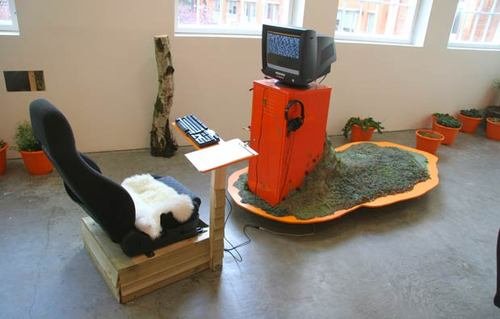Field Work
dal 30/5/2008 al 11/7/2008
Segnalato da
Amy Balkin
Roderick Hietbrink
Juneau Projects
Fritz Haeg
Servet Kocyigit
Mikael Levin
Rebecca Sakoun
Ingo Vetter & Annette Weisser
30/5/2008
Field Work
Smart Project Space, Amsterdam
Part 2. As a two-part exhibition and an ongoing discussion, the project conjectures two parallel, interconnected, and yet differently orientated trajectories that encompass art, nature and ecology. The exhibition address contemporary perceptions and understandings of nature and attempts to rethink the distinction most of us make between nature and culture.

Amy Balkin | Roderick Hietbrink | Juneau Projects | Fritz Haeg | Servet Koçyiğit | Mikael Levin | Rebecca Sakoun | Ingo Vetter & Annette Weisser
As a two-part exhibition and an ongoing discussion, ‘Field Work’ conjectures two parallel, interconnected, and yet differently orientated trajectories that encompass art, nature and ecology. The exhibitions ‘Field Work - part 1’ and ‘Field Work – part 2’ address contemporary perceptions and understandings of nature.
‘Field Work – part 1’ looked at contemporary perceptions and understandings of landscape, at how ones perception of landscape may be informed by human transformations of the environment, and by their mediation through artistic depictions and cultural representations – which are often partial and politically inflected. ‘Field Work – part 2’ is a gentle invitation to rethink the distinction most of us make between nature and culture. Each work in the show in its own way deals with the relationship between nature and a man-made environment.
Mikael Levin’s series of photographs ´Settling into Nature´ show not only how industrialization of a particular area in France resulted in the transformation of the landscape over time, but also how it meticulously wrecked it. His photographs document how the landscapes´ topography was shaped over time by its usage, and correlates this with restoration proposals that might shape it in the future.
Roderick Hietbrink’s video installation ‘Vivarium’ is an oddly pared-back exploration of the borders between nature and the built environment, as processed by a Dutchman arriving in Sydney – by proxy through the figure of a young female botanist.
Urban farming is addressed in the work of architect / artist Fritz Haeg, whose video documents the process of transforming a front lawn into an edible garden as part of his ongoing project ´Edible Estates´, and that of Ingo Vetter & Annette Weisser, showing an interview with one of the co-founders of the Detroit Agriculture Network called ´I am Farming Humanity´.
Amy Balkin’s slide show ´Public Smog´ narrates the process of working towards the opening of Public Smog, a shifting and fluctuating clean-air park and attempts to nominate the atmosphere as a UNESCO World Heritage Site.
Rebecca Sakoun shows ´Biotope 4´, a photograph of an abandoned, dying plant in a deserted office space.
Servet Koçyiğit’s video ´Bird Village´ was shot in Kus Koyu (Bird Village) in Turkey, that takes its name from the birdlike whistling that the villagers often use in place of words. Whistled languages are normally found and used in locations with abrupt relief created by difficult mountainous terrain.
Juneau Projects presents ´Underneath the Floorboards of the Forest, Empty Space´, a text-based computer game to visualize written passages describing a series of interlocking environments gradually moving from the countryside to the city, and ´Sewn to the Sky´, an interactive sound and visual performance / installation continuing their exploration of the interfaces between nature and technology.
The exhibitions are connected to a parallel trajectory in which the notion of ecology is the focal point. This parallel trajectory consists of an ongoing discussion with artists and curators, examining particular artistic and curatorial practices from the perspective of ecology, as a strategy rather then a ‘thematic’. This is in line with what feminist philosopher Lorraine Code indicates in her recent publication ‘Ecological Thinking – the politics of epistemic location’: “ecological thinking is not simply thinking about ecology or about the environment (…). It is a revisioned mode of engagement with knowledge, subjectivity, politics, ethics, science, citizenship, and agency that pervades and reconfigures theory and practice.”
The discussion text can be found on www.smartprojectspace.netand is also open for commentary and contributions by visitors. The discussion will eventually be published on our website. Comments can be sent to hilde@smartprojectspace.net. Exhibition visitors can also make comments on the spot by making use of the internet facility in our reading room, which in the framework of this exhibition contains books on art, nature and ecology.
Opening reception: Saturday 31 May 2008, 21 hrs
SMART Project Space
Arie Biemondstraat 1 - Amsterdam



